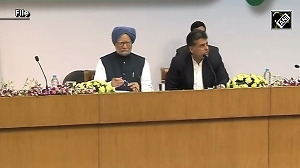The attacks on Prime Minister Manmohan Singh have started. One cabinet minister has said people elected from the Rajya Sabha should not be the ones to decide India's fate. Another minister has said that the Congress is looking to its president to set the priorities right -- the decision to go for elections should be taken by the party, not by the government.
Congress President and United Progressive Alliance Chairperson Sonia Gandhi is saying nothing. Last week a delegation from Madhya Pradesh met her to tell her that if elections were to be held, the assembly elections should be delinked from the general elections. If the two were held together, the Congress would be wiped out. "Aisa hai?" (is that so) she asked with seemingly gentle incredulity.
The fact is, the disarray in the managerial ranks of the Congress Party is out in the open for the second time in a year. First the presidential elections and now this.
The story tells itself if you view the Congress-Left relationship as an M&A gone wrong. When the Left parties decided to support the Congress, they did so because they wanted to keep the political marketplace free of the tainting influence of the Bharatiya Janata Party. The family that defines a common enemy stays together. So far, so good. But below the surface, there was also an attempt to suborn the other: elements in the Congress believed they could capitalise on the vastly superior secular credentials of the Left; the Left thought it could radicalise the Congress and claim the credit for it.
Both processes occurred in the parallel. Those in the Congress who were drawn into the honeypot of Left support became the strongest supporters of the Left within the Congress. The logic was: if we have to continue to fight against the BJP, we need a relationship with the Left because not just now, later too, we will need Left support to form a coalition. The days of single-party governments are gone.
Those in the Left parties keen to see a common front against the BJP prosper and flourish with some crumbs falling their way also looked the other way when ideological compromises were made. So when Sonia Gandhi went to Baharampur, West Bengal and said: "I am with the people of Nandigram who faced sorrow and hardship, especially with the women, children and farmers" and slammed the Left Front government over the law and order situation, the Left parties just ignored the jibe. That the UPA government was undertaking no land reform, was not the subject of popular strikes and agitations. It was only a subject for editorial writers at People's Democracy.
All these calculations didn't really affect the vast central stream in both groups that was content to hear views from the Left and right but refused to be swept off its feet by either.
This is where coalition management went wrong. It is the job of middle management to do Swot analyses, to anticipate difficulties. Shouldn't someone in the Congress have been talking to the Samajwadi Party in the full knowledge that the Left might have to pull out one day? Shouldn't efforts have been made to win over disgruntled allies of the BJP including Nitish Kumar? Could the Congress have prevented the deterioration of relations with the Telangana Rashtra Samiti to the point where they had to leave the UPA?
The straightforward fact is the Congress party is pretty much wasting its time setting such store by allies like the RJD and the DMK. In the forthcoming Lok Sabha elections --whether they are held early or on schedule -- Lalu Prasad is unlikely to get seats above single digit. With the DMK's electoral alliance all but collapsing, new actors -- literally and metaphorically -- are certain to emerge on the scene in Tamil Nadu politics, rendering the DMK politically irrelevant, at least temporarily. So a section in the Congress is citing pressure from allies to put off elections and dump the nuclear deal; but these are allies which are going to have zero or negligible value when the next election comes around.
So what does that tell us about Sonia Gandhi's leadership of the Congress? The presidential election was date-bound. It wasn't as if her party was unprepared for it. The Congress is going blue in the face claiming Pratibha Patil was their candidate all along, they just didn't want to show their hand. But frankly, no one believes this and sees that election as the biggest management failure of the Congress. Similarly, the current mess, where Pranab Mukherjee and A K Antony are running breathlessly from meeting to meeting -- with the Left, with the Prime Minister, with the Congress President -- and trying to cobble up strategic allies at the last minute to save the government and the nuclear deal is nothing but another management failure.
It is now clear that Sonia Gandhi is not the ruthless, tough Congress leader Indira Gandhi was. If she had been, she would have sacked then Punjab chief minister Amarinder Singh a long time ago, kept other Congress chief ministers on tenterhooks and evaluated their performance through independent agencies. There is much that she would have learnt. She might also have been wiser in her choice of Governors -- Buta Singh embarrassed the government but there are many others like him around, only less obvious.
Lalu Prasad paid great tributes to her respect for democracy. But the way Congress ministers are telling it, the whole party is against the nuclear deal -- barring the prime minister and Sonia Gandhi. So what we're seeing is not democracy at all, they say. The question is: what does Sonia Gandhi have to say about it all?






 © 2024 Rediff.com -
© 2024 Rediff.com -